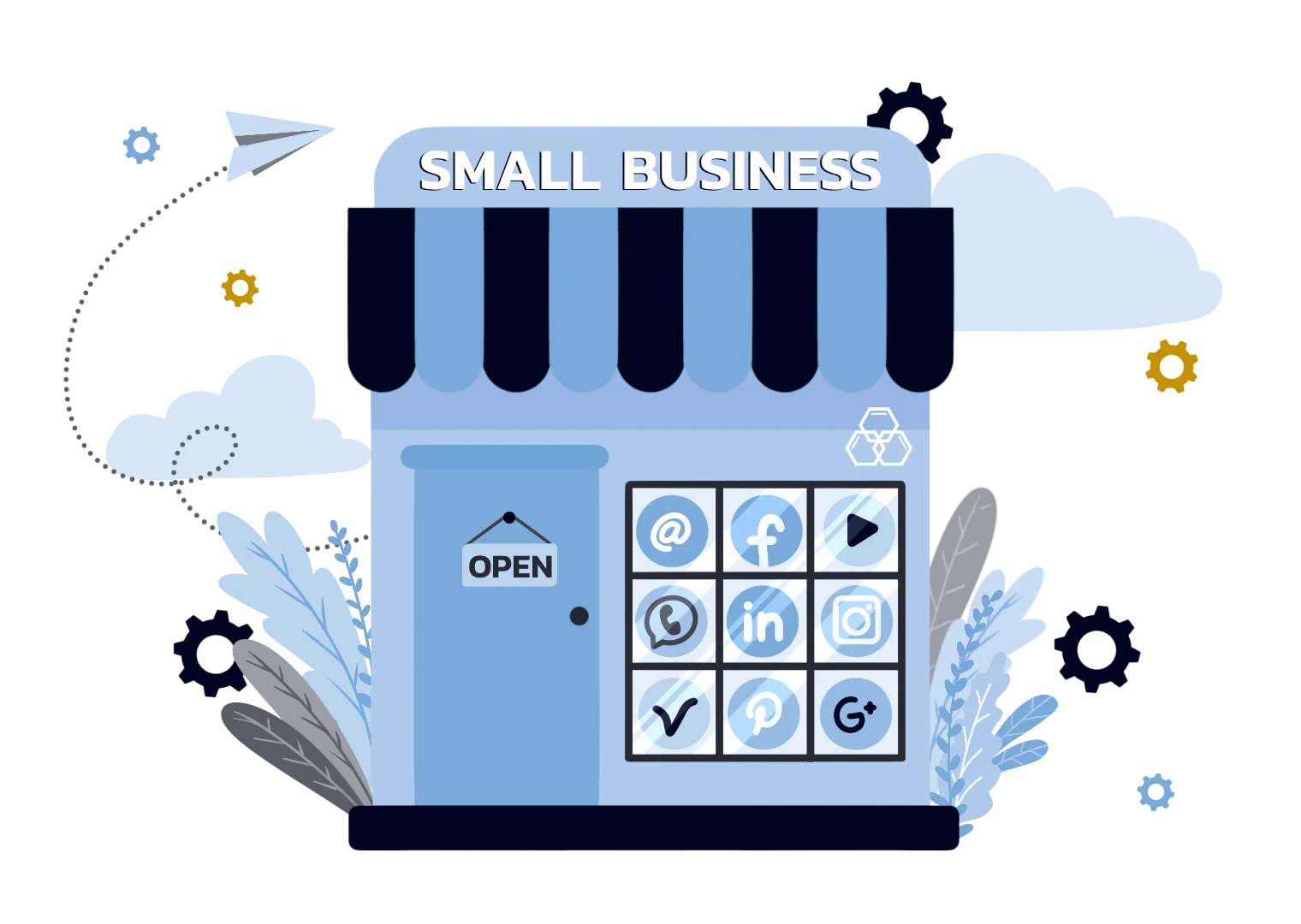Every brand has a chance for its reach to go global, and it has become much easier today with the massive progress in technology. However, despite the world getting smaller, the challenge becomes increasingly significant when a brand wishes to reach out to other regional markets. The localization process should be taken seriously; proper handling and research can help your brand perception. The need to have the particular expertise to pull off a successful localized marketing strategy that companies are willing to delegate their efforts to branding agencies. But the payoff is worth it.
This blog will explore all the things localized digital marketing is about, and we will tell you the steps you can take to lead the market that sets its sight worldwide.
Let's get started!

What is a Localized Marketing Strategy?
Localized Marketing is a strategy to redesign the branding elements, products or services, and digital assets like websites to cater to a specific local context. The designs address the need to adapt to a regional demographic's language, culture, customs, and preferences to connect more closely with the desired target market.
For example, Mcdonald's, a global brand, had their menus not only available in multiple languages, but they also incorporated traditional cuisine in their menus as well as respecting the customs of a specific country (e.g., In India, Big Mac, which has a beef patty, doesn't serve, and they instead had a Chicken Maharaja Mac, because Indians believe that cows are sacred animals).
Challenges in Designing Localized Marketing Campaigns
Localization is critical for businesses that wish to go global or stretch their reach to a broader audience. However, like any other marketing strategy, they come with their own challenges.
Localization is Costly
A localized marketing campaign entails cost in operation. This goes to the hiring cost for localization experts, local influencers, translators, and marketing experts. Moreover, the price also depends on the scale of localization on several elements, such as brand messaging translation and regional product variants.
Localization is Time-Consuming
Gathering data and making insights for local market research takes much time to ensure accuracy.
Localization can be Difficult
There are many complex tasks to do in undertaking localized market research. These are:
1. Brand Consistency - localizing the brand, especially if done poorly, will lose the core values and consistency of the brand identity, which can alienate the core audience and can even further confuse the local target audience.
2. Cultural Sensitivity - localized marketing campaigns done in digital channels are under scrutiny by global audiences, and they might see the gaps in the messaging and problems in integrating the local culture, language, and customs.
3. Local competitors - the target region may already have a market, and therefore comes the challenge of leading the competitors in their home court.
4. Legal Considerations - advertising local regulation, data protection, labeling requirements, and ethical considerations are just some things a brand must comply with the local regulations to ensure that the localized marketing campaign goes without problems.
Localization may have Accuracy Issues
Translation doesn't always go accurately; the marketing team must be open to corrections. Having multiple translators for better translation can fix this, but it may come at a higher price.
Localization must consider Nuances
Sometimes the subtle difference in the expressions can make a successful brand. Most local audiences can tell that the marketing campaigns have done substantial research when the localization efforts go beyond what is useful. But finding these nuances can be challenging.
Remember that these factors are not to discourage you but to set expectations on what it takes to build a localized digital marketing strategy for your brand.
Localized Digital Marketing: Strategies and Practices

Hire Local Experts for Research
Every successful strategy always starts with proper research. The insights you will get must develop a localization strategy that comprehensively addresses any possible gaps you might encounter when the campaign goes public.
In a digital channel, a slight misunderstanding in the brand messaging can compound into negative publicity, so you can always be careful. On a smaller scale, it can be done by your marketing team. However, working with local experts will resolve some of the issues in the marketing strategy, particularly in understanding the subtle aspects of language, culture, traditions, and preferences.
1. Language - Tools like translation software and reading books about the local language helps, but the most efficient way to deeply understand the language is by working with local experts. They already have the experience and the expertise necessary in marketing localization.
2. Culture and Traditions - Having a local expert tell you things like the origin of a custom, how it interacts with the local region, and how they are preserved, in a way, transfers the burden of proof to the audience themselves when you incorporate their culture to your localized marketing strategy. After all, local experts are part of the local audience.
3. Preference - a local audience's preferences are highly influenced by their surrounding environment, and understanding those influences can be made easier with a local expert.
Having a local expert in the region also acts as a representative of the area. Having them as employees tells you you are willing to connect closely to the locals externally and internally.
Humanize the Brand
One of the main goals of a branding strategy is to put a human face in the brand. Brand personality, core values, and voice are just some elements that make the brand human. Local Marketing teams are making this approach because customers are more comfortable when the ones selling them feel more like a person than a corporation. The humanized approach must also apply to localized marketing campaigns.
One way to approach this is to approach your brand messaging using dialects and simpler terms as if just talking to a person (e.g., using common local names or a local way of greeting someone).
Collaborate with Local Influencers
Humanizing a brand doesn't end with brand messaging or personality; you can also put an actual person to become the face of the brand. Like working with local experts, hiring local influencers gives you a better edge in penetrating a market, as your brand is presented in a familiar light.
Ensure that the influence you approach represents the local markets well and has the image that best represents your brand purpose and core values.

Approach Language Comprehensively
Translation does not only mean just changing one language into another. The process must adapt how the context is understood into a translated text that transcends languages.
Idioms, slang, and dialects can be exclusive primarily to a particular native language. Hence, one of your focuses on your local language research is understanding these subtle aspects and seeing how to incorporate them into your localization.
But the resulting localization shouldn't diverge from the true brand image. Make the corporate marketing team establish the true brand core values first, and appropriately add the local twist into that essentially puts the brand in a new yet familiar light.

Consider Culture in the Marketing Efforts
The insights you have learned from your gathered data about the culture should give you ideas on how to approach your marketing localization projects that shines a better light on their region's culture.
Make sure that the incorporation of the culture is approached respectfully and understands it more profoundly, which is where local experts can come in handy. They can provide better ideas on how to incorporate the local art, music, and way of life, in a way that makes the brand sounds like it was made for the region all along.

Optimize Websites and Communication Channels
Different countries have different search trends, and Search Engine Optimization efforts must consider the varying keywords that depend on the region, with differing factors like language, culture, and intent. Moreover, digital platforms vary, and the marketing team must reach out to media commonly used locally (e.gWeChat for Chinese audiences and LINE for Japanese).
Finally, having a separate communication account for each local region, handled by local employees, makes the messaging efficient and organized and prevents alienation from its followers - it would be confusing when a U.S.-based account suddenly speaks French all of a sudden.
Localize the Product
Marketing materials are one of many things that can be localized, and so are the products and services. For example, food items from international brands like KFC and Mcdonald's always consider local cuisine in their menus to appeal to the local taste preference. Moreover, they also think of several local traits like religion and culture. After all, you want to sell something other than pork-based items in a Middle-eastern country. Not only are the items themselves that can be localized, but so is the packaging. Consider highlighting local celebrities in your B2C products, like a local athlete for a protein shake.

Highlight Local Currencies
Don't ask your customer to make an effort themselves, and see how much they are going to pay in their own currencies. Digital channels, like websites, social media pages, and store pages, must display the local currency equivalent of your prices. Moreover, integrate local payment services and expand your payment methods to make the purchasing process accessible and efficient.
Final Thoughts
We couldn't overstate how daunting the localized marketing campaign might be. It is one aspect of marketing strategy where you have little room for error, and problems compound too quickly in digital channels. People look into their own cultures with pride, and being sensitive and understanding goes a long way in launching a localization campaign.
But you don't have to do it alone. Here at Evolv, we work with successful global companies like BIC and prioritize the human aspect in global marketing campaigns. We are a team of experts not only with the skills necessary to build your strong brand but also a group of people who are well-equipped with the knowledge should you decide to scale your brand globally.
So make your brand global today! Tell us how we can help you reach the global market and leave a lasting impression on your customer. You can also check our blog post and be updated with the latest trends in building a strong brand in the digital age.







